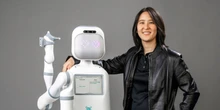Becoming a chartered financial analyst (CFA)—a certification that requires thousands of hours of professional experience, as well as taking a very rigorous exam; Investopedia calls it “one of the most respected designations in finance”—is no easy feat. That is, until now.
Two years ago, AI models could only pass the first two sections of the prestigious, three-part exam. The essay section, however, had it stumped.
And yet, in a new study from New York University’s Stern School of Business and GoodFin, an AI-powered wealth management platform, advanced AI like Gemini 2.5 Pro and Claude Opus passed the exam with flying colors. What would’ve taken a human 1,000 hours of studying over multiple years took AI a matter of minutes. Just two years ago, analysts were saying that it would never be able to pass the exam. It’s a sign of how advanced the technology has become, and once again fuels discussion about how AI could replace even the most challenging jobs.
But Anna Joo Fee, founder and CEO of GoodFin, which contributed to the research but did not fund it, told CNBC, “There are things like context and intent that are hard for the machine to assess right now. That’s where a human shines, in understanding your body language and cues.”
That didn’t stop social media from having all sorts of reactions.
One LinkedIn user called the news both an “impressive milestone” and “a little eye opening.” They wrote in a comment: “It doesn’t replace the human side of financial advising, but it does raise big questions about how the role of advisors and analysts will evolve in the near future.”
“AI passing the CFA in minutes while humans cry over flashcards for years? At this point, the calculator deserves a corner office,” another joked.
On the r/CFA subreddit, however, many were actually unimpressed. “Isn’t that like taking an open book exam? Unless your AI has memory problems,” one wrote. “Study: ‘water is wet’.”
While it may not be surprising to some, the study does make plain the rapid pace of change in AI’s capabilities in just a few short years.
“Right now, most of the conversation about work is about chasing the latest signal of what AI can do at work. It’s a messy, noisy, often contradictory conversation because AI is change that keeps changing,” chief economic opportunity officer at LinkedIn, Aneesh Raman, wrote in a post.
He encouraged: “This new era is about the mind not the machine. Focus on the mind—yours, your teams, your organizations, your societies—and so many opportunities will unfold in the coming years. It’s not the robots that are coming. The humans are coming!”
A finance professional at PwC agreed. “AI won’t replace finance professionals—but finance professionals using AI will replace those who don’t,” she wrote. Her advice is to be selective about the tools you adopt, prioritize use cases, and prepare to “work alongside AI.”
For now, though, this most recent headline is yet more fearmongering about the arrival of an omniscient entity plucking jobs from under our feet and kicking entire industries to the curb.
“It’s just another test a machine can pass faster, cheaper, and without breaking a sweat. Let’s be real. This is bigger than finance,” another LinkedIn user wrote. “This is a warning shot for every ‘thinking’ job we thought was future-proof.”









No comments